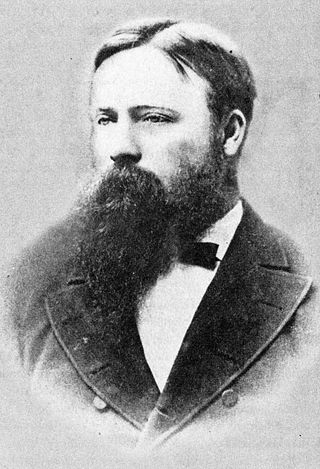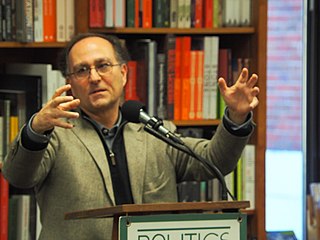Development
The book takes its title from societies for philosophical discussion founded by Peirce, in 1872 in Cambridge, Massachusetts, and in 1879 at Johns Hopkins University. The former was recalled by Peirce 30 years later as being named the Metaphysical Club, the latter officially bore that name. [1]
Menand traces the biography of each of the members, showing ways in which they were connected and how all were influenced by their times and by thinkers such as Ralph Waldo Emerson. The book begins by examining the family history and early life of Oliver Wendell Holmes, Jr., future U.S. Supreme Court justice, then describes how Holmes, James, Peirce, Dewey, and others were acquainted with each other, and how their association led to James's development of pragmatism.
A main focus of the book is the influence of the American Civil War on Americans in general and on the subjects of this book, as well as how the war inspired pragmatism. For Holmes, the Civil War destroyed his entire perspective on the world and greatly shaped his judicial philosophy, which developed at roughly the same time as Dewey, James, and Peirce were beginning to develop pragmatist ideas. Other influences treated by the book are the emerging sciences of statistics and evolutionary biology.

Charles Sanders Peirce was an American scientist, mathematician, logician, and philosopher who is sometimes known as "the father of pragmatism". According to philosopher Paul Weiss, Peirce was "the most original and versatile of America's philosophers and America's greatest logician". Bertrand Russell wrote "he was one of the most original minds of the later nineteenth century and certainly the greatest American thinker ever".

In philosophy, empiricism is an epistemological view that holds that true knowledge or justification comes only or primarily from sensory experience. It is one of several competing views within epistemology, along with rationalism and skepticism. Empiricism emphasizes the central role of empirical evidence in the formation of ideas, rather than innate ideas or traditions. However, empiricists may argue that traditions arise due to relations of previous sensory experiences.

William James was an American philosopher, historian, and psychologist, and the first educator to offer a psychology course in the United States. James is considered to be a leading thinker of the late 19th century, one of the most influential philosophers of the United States, and the "Father of American psychology".

Pragmatism is a philosophical tradition that views language and thought as tools for prediction, problem solving, and action, rather than describing, representing, or mirroring reality. Pragmatists contend that most philosophical topics—such as the nature of knowledge, language, concepts, meaning, belief, and science—are all best viewed in terms of their practical uses and successes.

Richard McKay Rorty was an American philosopher. Educated at the University of Chicago and Yale University, he had strong interests and training in both the history of philosophy and in contemporary analytic philosophy. Rorty's academic career included appointments as the Stuart Professor of Philosophy at Princeton University, Kenan Professor of Humanities at the University of Virginia, and Professor of Comparative literature at Stanford University. Among his most influential books are Philosophy and the Mirror of Nature (1979), Consequences of Pragmatism (1982), and Contingency, Irony, and Solidarity (1989).

"Pragmaticism" is a term used by Charles Sanders Peirce for his pragmatic philosophy starting in 1905, in order to distance himself and it from pragmatism, the original name, which had been used in a manner he did not approve of in the "literary journals". Peirce in 1905 announced his coinage "pragmaticism", saying that it was "ugly enough to be safe from kidnappers". Today, outside of philosophy, "pragmatism" is often taken to refer to a compromise of aims or principles, even a ruthless search for mercenary advantage. Peirce gave other or more specific reasons for the distinction in a surviving draft letter that year and in later writings. Peirce's pragmatism, that is, pragmaticism, differed in Peirce's view from other pragmatisms by its commitments to the spirit of strict logic, the immutability of truth, the reality of infinity, and the difference between (1) actively willing to control thought, to doubt, to weigh reasons, and (2) willing not to exert the will, willing to believe. In his view his pragmatism is, strictly speaking, not itself a whole philosophy, but instead a general method for the clarification of ideas. He first publicly formulated his pragmatism as an aspect of scientific logic along with principles of statistics and modes of inference in his "Illustrations of the Logic of Science" series of articles in 1877-8.

Susan Haack is a distinguished professor in the humanities, Cooper Senior Scholar in Arts and Sciences, professor of philosophy, and professor of law at the University of Miami in Coral Gables, Florida.
Louis Menand is an American critic, essayist, and professor, who wrote the Pulitzer-winning book The Metaphysical Club (2001), an intellectual and cultural history of late 19th and early 20th century America.
A pragmatic theory of truth is a theory of truth within the philosophies of pragmatism and pragmaticism. Pragmatic theories of truth were first posited by Charles Sanders Peirce, William James, and John Dewey. The common features of these theories are a reliance on the pragmatic maxim as a means of clarifying the meanings of difficult concepts such as truth; and an emphasis on the fact that belief, certainty, knowledge, or truth is the result of an inquiry.

Robert Boyce Brandom is an American philosopher who teaches at the University of Pittsburgh. He works primarily in philosophy of language, philosophy of mind and philosophical logic, and his academic output manifests both systematic and historical interests in these topics. His work has presented "arguably the first fully systematic and technically rigorous attempt to explain the meaning of linguistic items in terms of their socially norm-governed use, thereby also giving a non-representationalist account of the intentionality of thought and the rationality of action as well."
Laurence BonJour is an American philosopher and Emeritus of Philosophy at the University of Washington.
Neopragmatism, sometimes called post-Deweyan pragmatism, linguistic pragmatism, or analytic pragmatism, is the philosophical tradition that infers that the meaning of words is a result of how they are used, rather than the objects they represent.

Chauncey Wright was an American philosopher and mathematician, who was an influential early defender of Darwinism and an important influence on American pragmatists such as Charles Sanders Peirce and William James.

This Charles Sanders Peirce bibliography consolidates numerous references to the writings of Charles Sanders Peirce, including letters, manuscripts, publications, and Nachlass. For an extensive chronological list of Peirce's works, see the Chronologische Übersicht on the Schriften (Writings) page for Charles Sanders Peirce.
The Metaphysical Club was a name attributed by the philosopher Charles Sanders Peirce, in an unpublished paper over thirty years after its foundation, to a conversational philosophical club that Peirce, the future Supreme Court Justice Oliver Wendell Holmes Jr., the philosopher and psychologist William James, amongst others, formed in January 1872 in Cambridge, Massachusetts, and dissolved in December 1872. Other members of the club included Chauncey Wright, John Fiske, Francis Ellingwood Abbot, Nicholas St. John Green, and Joseph Bangs Warner.
Richard Shusterman is an American pragmatist philosopher. Known for his contributions to philosophical aesthetics and the emerging field of somaesthetics, currently he is the Dorothy F. Schmidt Eminent Scholar in the Humanities and Professor of Philosophy at Florida Atlantic University.

Richard Jacob Bernstein was an American philosopher who taught for many years at Haverford College and then at The New School for Social Research, where he was Vera List Professor of Philosophy. Bernstein wrote extensively about a broad array of issues and philosophical traditions including American pragmatism, neopragmatism, critical theory, deconstruction, social philosophy, political philosophy, and hermeneutics.

American philosophy is the activity, corpus, and tradition of philosophers affiliated with the United States. The Internet Encyclopedia of Philosophy notes that while it lacks a "core of defining features, American Philosophy can nevertheless be seen as both reflecting and shaping collective American identity over the history of the nation". The philosophy of the Founding Fathers of the United States is largely seen as an extension of the European Enlightenment. A small number of philosophies are known as American in origin, namely pragmatism and transcendentalism, with their most prominent proponents being the philosophers William James and Ralph Waldo Emerson respectively.

Robert B. Talisse is an American philosopher and political theorist. He is currently Professor of Philosophy and Chair of the Philosophy Department at Vanderbilt University in Nashville, Tennessee, where he is also a Professor of Political Science. Talisse is a former editor of the academic journal Public Affairs Quarterly, and a regular contributor to the blog 3 Quarks Daily, where he posts a monthly column with his frequent co-author and fellow Vanderbilt philosopher Scott Aikin. He earned his PhD in Philosophy from the Graduate Center of the City University of New York in 2001. His principal area of research is political philosophy, with an emphasis on democratic theory and liberalism.

Scott L. Pratt is a professor of philosophy at the University of Oregon. His research and teaching is focused primarily upon American philosophy, especially in the areas of Native American philosophy, pragmatism, philosophy of race and gender, philosophy of education, and the history of logic. He has previously served in various administrative roles at the University of Oregon, including executive vice provost for academic affairs (2017–2019), dean of the graduate school (2015–2017), and associate dean for the humanities in the College of Arts and Sciences (2006–2009).










